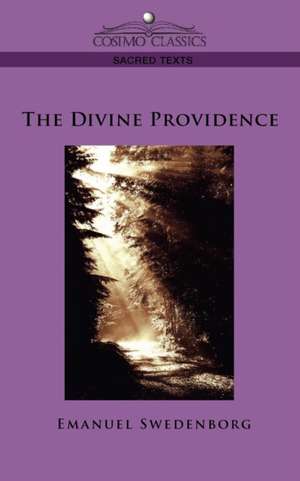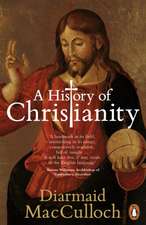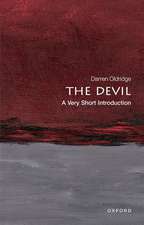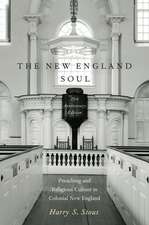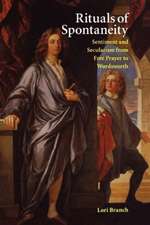The Divine Providence: Cosimo Classics Sacred Texts
Autor Emanuel Swedenborgen Limba Engleză Paperback – 31 oct 2005
| Toate formatele și edițiile | Preț | Express |
|---|---|---|
| Paperback (3) | 89.53 lei 3-5 săpt. | +45.46 lei 5-11 zile |
| Swedenborg Foundation Publishers – 12 ian 2010 | 89.53 lei 3-5 săpt. | +45.46 lei 5-11 zile |
| A & D Publishing – 15 oct 2007 | 100.80 lei 6-8 săpt. | |
| COSIMO CLASSICS – 31 oct 2005 | 124.67 lei 6-8 săpt. | |
| Hardback (1) | 228.71 lei 6-8 săpt. | |
| A & D Publishing – 3 apr 2018 | 228.71 lei 6-8 săpt. |
Preț: 124.67 lei
Nou
Puncte Express: 187
Preț estimativ în valută:
23.88€ • 24.60$ • 20.00£
23.88€ • 24.60$ • 20.00£
Carte tipărită la comandă
Livrare economică 24 februarie-10 martie
Preluare comenzi: 021 569.72.76
Specificații
ISBN-13: 9781596053311
ISBN-10: 1596053313
Pagini: 292
Dimensiuni: 127 x 203 x 17 mm
Greutate: 0.32 kg
Editura: COSIMO CLASSICS
Seria Cosimo Classics Sacred Texts
Locul publicării:United States
ISBN-10: 1596053313
Pagini: 292
Dimensiuni: 127 x 203 x 17 mm
Greutate: 0.32 kg
Editura: COSIMO CLASSICS
Seria Cosimo Classics Sacred Texts
Locul publicării:United States
Notă biografică
Emanuel Swedenborg (1688-1772) was a Swedish scientist, nobleman, and theologian who spent his life investigating the mysteries of the soul. Born in Stockholm to a staunchly Lutheran family, he graduated from the University of Uppsala and then traveled to England, Holland, France, and Germany to study the leading scientists of the time. He gained favor with Sweden’s King Charles XII, who gave him the position of overseer of the Swedish mining industry. Later, he was given a seat on the Swedish House of Nobles by Charles XII’s successor, Queen Ulrika Eleonora. Between 1743 and 1745 he began to have visions of heaven, hell, and Jesus Christ which resulted in a stream of books about the nature of God, the afterlife, and the inner meaning of the Bible. He devoted the last decades of his life to studying Scripture and presenting his own unique theology to the world.
Extras
“People who are completely materialistic say to themselves, ‘What is divine providence? Is it anything but a word that the masses hear from the clergy? Has anyone ever seen a trace of it? Aren’t our planning and wisdom and deceit and malice the real causes of everything that happens in the world? Is the rest anything but needs and deductions and a lot of accidents? Is divine providence hidden away somewhere in all this? How can it be present in trickery and deceit? Yet these people say that divine providence is in control of everything. Show it to me, and I’ll believe it. Can anyone believe in it otherwise?’
“This is the voice of the strict materialist, but spiritually-minded people speak differently. Since they acknowledge God, they acknowledge divine providence too. They see it as well, but they cannot show it to anyone who thinks only in physical terms, on the basis of physical events. These people cannot raise their minds above the material world and see the signs of divine providence in its outward appearances. They cannot figure out anything about it on the basis of its laws, which are laws of divine wisdom. So if they were to see it with any clarity, they would make it material and thereby not only becloud it with distortions but also profane it. Instead of recognizing it, they would deny it; and anyone who at heard denies divine providence is denying the Lord as well. . . .
“Divine providence is never acting in the same direction as our deliberate love. It is always acting against it. This is because from our own inherited evil we are constantly hungering for the deepest hell, while the Lord, through his divine providence, is constantly leading us away from it and drawing us out of it, first to some milder hell, then out of hell, and eventually to himself in heaven. This effort of divine providence is going on all the time; so if we were to see or feel vividly this carrying off and pulling away, we would be outraged. God would become our enemy, and in the evil of our self-centeredness we would deny him. So to prevent us from knowing about this, we are kept in a free state where all we can know is that we are leading ourselves.”
“This is the voice of the strict materialist, but spiritually-minded people speak differently. Since they acknowledge God, they acknowledge divine providence too. They see it as well, but they cannot show it to anyone who thinks only in physical terms, on the basis of physical events. These people cannot raise their minds above the material world and see the signs of divine providence in its outward appearances. They cannot figure out anything about it on the basis of its laws, which are laws of divine wisdom. So if they were to see it with any clarity, they would make it material and thereby not only becloud it with distortions but also profane it. Instead of recognizing it, they would deny it; and anyone who at heard denies divine providence is denying the Lord as well. . . .
“Divine providence is never acting in the same direction as our deliberate love. It is always acting against it. This is because from our own inherited evil we are constantly hungering for the deepest hell, while the Lord, through his divine providence, is constantly leading us away from it and drawing us out of it, first to some milder hell, then out of hell, and eventually to himself in heaven. This effort of divine providence is going on all the time; so if we were to see or feel vividly this carrying off and pulling away, we would be outraged. God would become our enemy, and in the evil of our self-centeredness we would deny him. So to prevent us from knowing about this, we are kept in a free state where all we can know is that we are leading ourselves.”
Descriere
Descriere de la o altă ediție sau format:
In Divine Providence, Swedish scientist-turned-seer Emanuel Swedenborg undertakes the difficult task of bridging that transcendent vision of a perfectly loving God with the sometimes unloving world where we all live.
